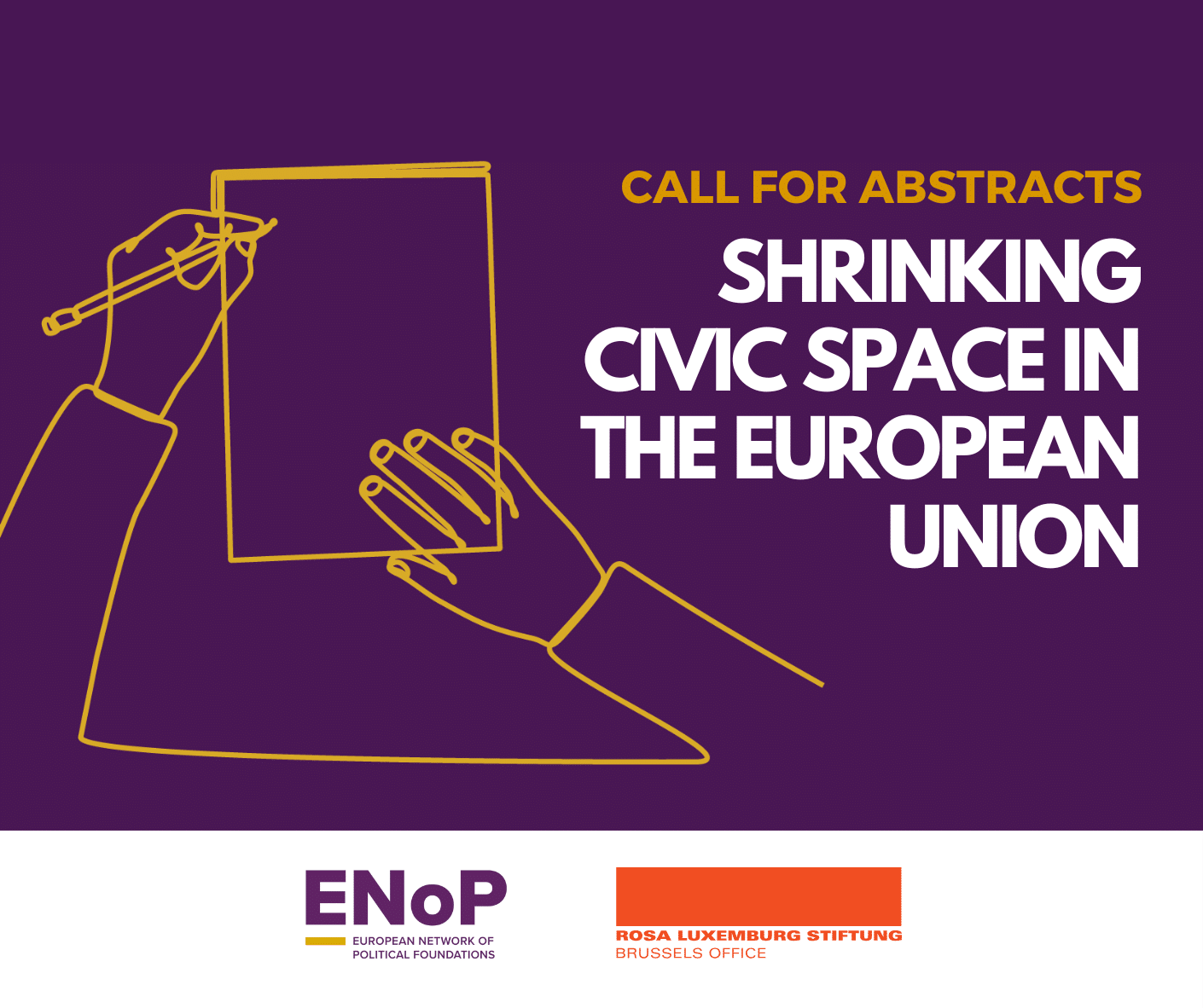Call for Abstracts | Shrinking Civic Space in the European Union

Joint online publication by the Rosa-Luxemburg-Stiftung, Brussels Office (RLS) and the European Network of Political Foundations (ENoP)
Across the EU, civil society organisations (CSOs), activists, and independent media face increasing threats to their ability to operate freely. Legal restrictions, smear campaigns, and funding cuts are some of the challenges facing civic space, especially organisations working on democracy, social justice, and environmental issues.
A key driver of this trend is a shift in EU priorities, with greater emphasis on defence, security and competitiveness, accompanied by political narratives that question the legitimacy of CSOs. At the same time, the funding landscape has worsened due to shrinking public budgets both nationally and at an EU level. CSOs also continue to face structural imbalances when participating in consultations and advisory groups, while recent debates risk further weakening their place at the table. Taken together, these developments threaten to narrow the space for advocacy and limit civil society’s contribution to democratic participation.
These concerns gain particular urgency as EU Member States prepare to negotiate the next Multiannual Financial Framework for 2028–2034. As debates in the European Parliament have already called into question the use of EU funds by NGOs, the risk that already limited resources for civil society could be further constrained is mounting.
Against this backdrop, ENoP and RLS Brussels invite researchers, practitioners, journalists and activists to submit abstracts for a background analysis paper that documents and analyses the causes and consequences related to shrinking civic space in the EU, and proposes responses to these challenges.
Objectives:
- Map and analyse the channels through which civic space is being restricted in the EU, including legal, budgetary, and administrative, and identify sectors that are particularly affected.
- Examine the narratives underpinning the current backlash against civil society in the EU.
- Assess how EU budget priorities for the next MFF, with their stronger focus on defence, competitiveness and industrial policy, will impact civil society.
- Investigate how these changes and constraints impact CSOs’ participation in public decision-making and consultations, for example in advisory groups.
- Identify strategies and safeguards that can counteract the shrinking of civic space, such as legal protections, funding models, and participatory mechanisms, and explore how these can be adapted to current challenges.
Submission guidelines:
- Format: Contributions should take the form of a background analysis paper addressing the objectives outlined above, with a length of 4,000-6,000 words, excluding the bibliography. The publication addresses policy-makers, CSOs, activists, journalists and academics. The paper will be published on ENoP’s and RLS’s websites and circulated via multiple channels across our broad networks.
- Abstracts: Please submit an abstract of up to 300 words (in English) by 12 October 2025, 23:59 CET to alessia.gonfroid@enop.eu and ada.regelmann@rosalux.org.
- Notification: Selected author(s) will be notified on 15 October 2025, followed by a short introductory call and project brief on 16 October 2025.
- Timeline:
- Submission of an extended outline including core arguments/observations: 3 November 2025.
- Submission of full draft: 17 November 2025.
- Final publication: early December 2025
- Remuneration: An honorarium of 800€ (net)
About the organisations:
The Rosa-Luxemburg-Stiftung is an internationally active, left-wing non-profit organisation for civic education affiliated with Germany’s ‘Die Linke’ (Left Party). Founded in 1990, the Rosa-Luxemburg-Stiftung has been committed to the analysis of social and political processes and developments worldwide. We work towards a more just world system based on international solidarity.
ENoP is a network of political foundations affiliated to different political ideologies across the democratic spectrum. ENoP and its members advocate for the respect of democratic principles and political pluralism inside and outside of Europe. They build bridges, create common grounds and understanding between political and civil society actors in Europe and partner-countries to strengthen core democratic values, and contribute to nurturing pluralistic and inclusive societies.